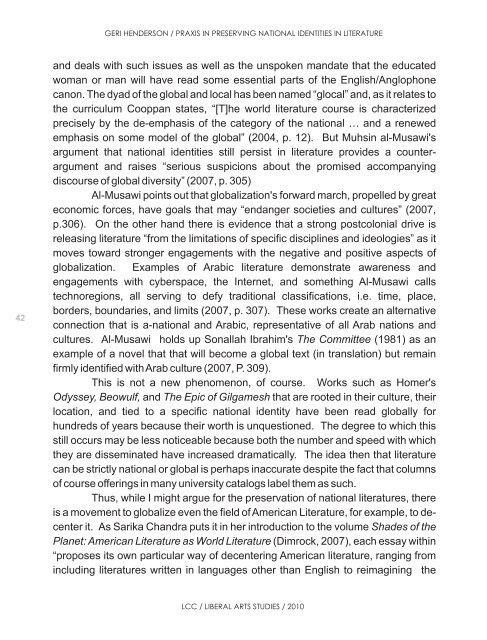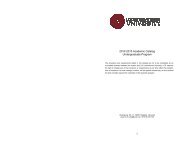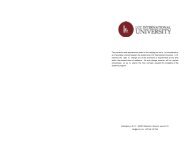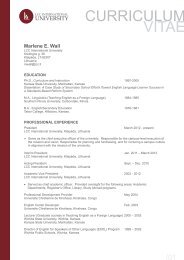lcc liberal arts studies / 2010 volume iii - LCC International University
lcc liberal arts studies / 2010 volume iii - LCC International University
lcc liberal arts studies / 2010 volume iii - LCC International University
Create successful ePaper yourself
Turn your PDF publications into a flip-book with our unique Google optimized e-Paper software.
42<br />
GERI HENDERSON / PRAXIS IN PRESERVING NATIONAL IDENTITIES IN LITERATURE<br />
and deals with such issues as well as the unspoken mandate that the educated<br />
woman or man will have read some essential p<strong>arts</strong> of the English/Anglophone<br />
canon. The dyad of the global and local has been named “glocal” and, as it relates to<br />
the curriculum Cooppan states, “[T]he world literature course is characterized<br />
precisely by the de-emphasis of the category of the national … and a renewed<br />
emphasis on some model of the global” (2004, p. 12). But Muhsin al-Musawi's<br />
argument that national identities still persist in literature provides a counterargument<br />
and raises “serious suspicions about the promised accompanying<br />
discourse of global diversity” (2007, p. 305)<br />
Al-Musawi points out that globalization's forward march, propelled by great<br />
economic forces, have goals that may “endanger societies and cultures” (2007,<br />
p.306). On the other hand there is evidence that a strong postcolonial drive is<br />
releasing literature “from the limitations of specific disciplines and ideologies” as it<br />
moves toward stronger engagements with the negative and positive aspects of<br />
globalization. Examples of Arabic literature demonstrate awareness and<br />
engagements with cyberspace, the Internet, and something Al-Musawi calls<br />
technoregions, all serving to defy traditional classifications, i.e. time, place,<br />
borders, boundaries, and limits (2007, p. 307). These works create an alternative<br />
connection that is a-national and Arabic, representative of all Arab nations and<br />
cultures. Al-Musawi holds up Sonallah Ibrahim's The Committee (1981) as an<br />
example of a novel that that will become a global text (in translation) but remain<br />
firmly identified with Arab culture (2007, P. 309).<br />
This is not a new phenomenon, of course. Works such as Homer's<br />
Odyssey, Beowulf, and The Epic of Gilgamesh that are rooted in their culture, their<br />
location, and tied to a specific national identity have been read globally for<br />
hundreds of years because their worth is unquestioned. The degree to which this<br />
still occurs may be less noticeable because both the number and speed with which<br />
they are disseminated have increased dramatically. The idea then that literature<br />
can be strictly national or global is perhaps inaccurate despite the fact that columns<br />
of course offerings in many university catalogs label them as such.<br />
Thus, while I might argue for the preservation of national literatures, there<br />
is a movement to globalize even the field of American Literature, for example, to decenter<br />
it. As Sarika Chandra puts it in her introduction to the <strong>volume</strong> Shades of the<br />
Planet: American Literature as World Literature (Dimrock, 2007), each essay within<br />
“proposes its own particular way of decentering American literature, ranging from<br />
including literatures written in languages other than English to reimagining the<br />
<strong>LCC</strong> / LIBERAL ARTS STUDIES / <strong>2010</strong>






